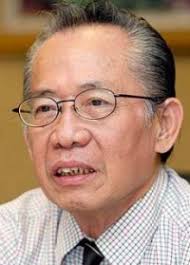SHAH ALAM, Dec 22 (Bernama) -- The fall of four more states - Penang, Perak, Selangor and Kedah - to the opposition during the March 8 general election was the regarded as a "political tsunami" for the Barisan Nasional (BN).
The BN had also failed to recapture Kelantan from PAS since it was toppled in the state in 1990.

In SELANGOR, former corporate figure,
Tan Sri Abdul Khalid Ibrahim became the menteri besar of the Pakatan Rakyat-led state government comprising Parti Keadilan Rakyat (PKR), PAS and DAP.
BN's downfall in Selangor, one of the most developed states in the country, was attributed to the disenchantment of the people towards the government over various issues especially irregularities in land matters.
The Chinese community also felt slighted over racist remarks by certain Umno leaders while the Indian community cried foul over demolition of Hindu temples.
The new Selangor state government faced a daunting task to honour its election promises.
However, it managed to provide 20 cubic metres of water free every month to Selangor residents from June, enjoyed only by consumers with individual water meters.

Former Selangor mentri besar
Datuk Seri Dr Mohamad Khir Toyo (left) chided the state government for its failure to reduce the quit rent of private properties by 20 per cent and that of commercial properties by 10 per cent.
He claimed that certain quarters had defaulted on the quit rent payment to register their protest.
Hardly had the issue died down, Seputeh Member of Parliament
Teresa Kok (right) filed two

defamation suits against the Utusan Melayu Group over two articles published in the two newspapers under its stable on Sept 10 and Oct 12.
Calling them "highly defamatory", the Selangor executive councillor claimed that the first article in Utusan Malaysia had resulted in her week-long detention last month under the Internal Security Act.
On Oct 12, Mingguan Malaysia published a short story titled
"Politic Baru YB Josephine", which Kok claimed referred either directly or by innuendo to her.

In Penang, DAP secretary-general
Lim Guan Eng (left) took over

as chief minister from
Tan Sri Dr Koh Tsu Koon (right) after the opposition whitewashed the BN in the state.
DAP won 19 of the 40 state seats, PKR nine, PAS one while the BN could only manage 11 seats.
In a show of strength, PKR won the Permatang Pauh parliamentary by-election with a bigger majority on Aug 26

through PKR de-facto leader
Datuk Seri Anwar Ibrahim (right).
It paved the way for him to return to Parliament following an absence of 10 years from political office and being appointed the opposition leader.
In September, the DAP-PKR government rejected the proposed RM25 billion
Penang Global City Centre (PGCC) with Lim describing it "as good as dead."
He said the developers had failed to submit planning plans as required by the state.
The state government also put up multi-lingual road signs in Georgetown despite protests from the Unity, Culture, Arts and Heritage Ministry claiming it was part of its efforts to promote tourism in the Unesco World Heritage site.
In July, Georgetown on the island was declared a World Heritage site along with Melaka by Unesco.
The construction of the planned 26km second Penang bridge linking Batu Maung on the island and Batu Kawan on the mainland is expected to be a catalyst for growth in Seberang Perai besides the island.

In Kedah, former Kedah menteri besar
Datuk Seri Mahdzir Khalid (right)
and former opposition leader
Azizan Abdul Razak (left) of PAS "swapped" positions.
The Sultan of Kedah,
Tuanku Abdul Halim Mu'adzam Shah, 82, celebrated his Golden Jubilee in July after 50 years successfully reigning the state.
Several districts in Kedah were hit by floods in September, during the Ramadan fasting month, forcing about 5,000 people to seek refuge at relief centres.
In PERAK, the DAP had initially protested against the appointment of
 Mohamad Nizar Jamaluddin
Mohamad Nizar Jamaluddin (now Datuk) of PAS as mentri besar as he represented only the third and smallest political party in the coalition.
Pas won six state seats while PKR seven and the DAP 18.
The state government's decision to allow 149,000 people living in 349 planned and 134 new villages in Perak, with an appreciated land value of over RM1.5 billion, to apply for freehold titles has also created a controversy.

Senior executive councillor
Datuk Ngeh Koo Ham (left) said the freehold titles were in perpetuity and not for 999 years as claimed by certain parties.
He claimed that the issuing of freehold titles to those living in planned and new villages was not against the National Land Code, as the state had consulted a former Court of Appeal judge and a panel of experienced lawyers on the matter before implementing the move.
-- BERNAMA




















